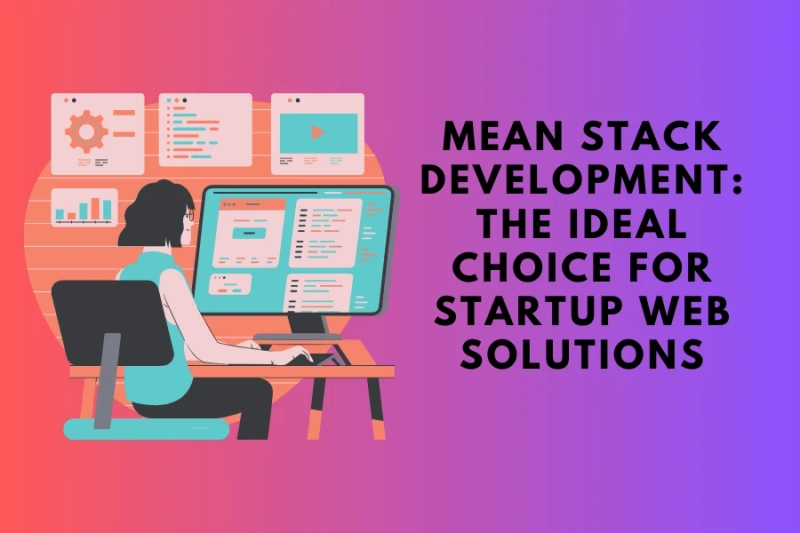In today's fast-paced digital landscape, startups face immense pressure to create robust and scalable web solutions that can quickly adapt to changing market conditions. The choice of technology stack plays a pivotal role in determining a project's success, and one stack that has gained significant popularity among startups is the MEAN stack. Comprising MongoDB, Express.js, Angular, and Node.js, the MEAN stack offers a versatile and efficient toolkit for building web solutions tailored to the unique needs and challenges faced by startups.
Speed and Efficiency
Startups are all about speed and efficiency, aiming to bring their ideas to market as quickly as possible. The MEAN stack excels in this aspect, offering a full JavaScript technology stack that spans both the front-end and back-end of web development. This uniformity in programming language reduces the need for context switching, allowing developers to work seamlessly across the entire application stack. Node.js, a crucial component of the MEAN stack, is renowned for its non-blocking, event-driven architecture, making it incredibly efficient and capable of handling a high volume of concurrent connections. This efficiency translates into faster development cycles, rapid prototyping, and quicker time-to-market for startup products.
Cost-Effective Development
Cost considerations are paramount for startups, which often operate with limited budgets. The MEAN stack leverages open-source technologies, minimizing licensing fees and reducing the overall cost of development. MongoDB, for instance, is a NoSQL database that is open source and highly scalable, providing startups with a cost-effective solution for storing and managing data. Moreover, the availability of a vast and active community of MEAN stack developers means that startups can find skilled professionals without the need for expensive proprietary skill sets.
Scalability and Flexibility
Startups aspire to grow rapidly, and their web solutions must be able to scale accordingly. The MEAN stack offers inherent scalability and flexibility, allowing startups to handle increased user loads and expanding data requirements without major architectural overhauls. MongoDB's document-based structure and horizontal scaling capabilities make it well-suited for managing large volumes of data, while Node.js's event-driven, non-blocking architecture ensures that applications can handle a high number of concurrent requests without performance degradation. This adaptability to changing demands is crucial for startups that need to pivot quickly in response to market feedback.
Real-time Capabilities
Many modern web solutions require real-time features, such as chat functionality, notifications, or live updates. Node.js, a key component of the MEAN stack, is specifically designed for building real-time applications. Its event-driven nature and WebSocket support enable startups to create dynamic, interactive, and responsive user experiences. This real-time capability can be a game-changer for startups operating in industries like e-commerce, social networking, or collaboration tools, where user engagement and real-time communication are critical.
Community and Ecosystem
The MEAN stack benefits from a vibrant and active community of developers and a rich ecosystem of libraries, modules, and tools. This community-driven development approach results in a wealth of resources, tutorials, and open-source contributions that can significantly accelerate the development process. Startups can tap into this extensive knowledge base to troubleshoot issues, find solutions to common problems, and access a wide range of pre-built components, reducing development time and costs.
Single Language, Full Stack
A notable advantage of the MEAN stack is its use of a single language, JavaScript, for both front-end and back-end development. This unified language approach simplifies the development process, streamlines communication within development teams, and facilitates code reuse. Developers familiar with JavaScript can work on the entire application stack, eliminating the need for learning multiple programming languages and frameworks. This not only speeds up development but also enhances code maintainability, making it easier for startups to onboard new team members and maintain their web solutions in the long run.
Cross-Platform Capabilities
In today's multi-device world, startups need web solutions that are accessible across various platforms and devices. Angular, a front-end framework in the MEAN stack, offers a powerful and flexible approach to building responsive web applications. Using Angular, startups can create web applications that adapt seamlessly to different screen sizes and devices, providing a consistent user experience. This cross-platform compatibility is essential for startups looking to reach a broad audience and ensure their web solutions are future-proof.
Conclusion
In the highly competitive landscape of startups, choosing the right technology stack is crucial for success. The MEAN stack, with its emphasis on speed, efficiency, cost-effectiveness, scalability, real-time capabilities, strong community support, and cross-platform compatibility, emerges as the ideal choice for building web solutions tailored to the specific needs of startups. Its unified JavaScript ecosystem, coupled with the ability to rapidly prototype and iterate, positions MEAN stack development as a key enabler for startups striving to bring innovative products to market quickly while maintaining the flexibility to adapt to evolving business requirements. As startups continue to disrupt industries and push the boundaries of innovation, the MEAN stack remains a powerful tool in their arsenal, helping them turn their ideas into reality and achieve sustainable growth in a dynamic digital landscape.


